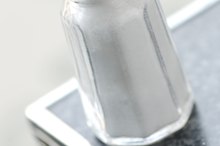What does fact checked mean?
At Healthfully, we strive to deliver objective content that is accurate and up-to-date. Our team periodically reviews articles in order to ensure content quality. The sources cited below consist of evidence from peer-reviewed journals, prominent medical organizations, academic associations, and government data.
- Arthritis and Rheumatism: Prevalence of Gout and Hyperuricemia in the Us General Population: the National Health and Nutrition Examination Survey 2007-2008
- MedlinePlus: Gout
The information contained on this site is for informational purposes only, and should not be used as a substitute for the advice of a professional health care provider. Please check with the appropriate physician regarding health questions and concerns. Although we strive to deliver accurate and up-to-date information, no guarantee to that effect is made.
Gout and Shrimp
If you have gout, you belong to a group of 8 million Americans estimated to suffer from this painful arthritic condition, according to data gathered from the National Health and Nutrition Examination Survey 2007-2008 1. Gout occurs when excess uric acid, a byproduct of purine metabolism, accumulates in your joints. The result is swelling, stiffness and pain. Gout sufferers typically need to follow a low-purine diet to control their symptoms. Various foods contain purines, particularly organ meats, anchovies, sardines, mussels and shrimp.
If you are experiencing serious medical symptoms, seek emergency treatment immediately.
Bad News for Shrimp Lovers
You may need to avoid eating shrimp if your doctor recommends a low-purine diet. Limit your purine intake to 100 to 150 milligrams daily on this type of diet. Shrimp belong to the very high purine category. Foods in this group contain anywhere from 100 to 1,000 milligrams of purines per 3-ounce serving. Gout sufferers must usually avoid purine-rich foods. Only your doctor can determine whether your gout symptoms are well controlled enough for you to consume shrimp, how much and how often.
- You may need to avoid eating shrimp if your doctor recommends a low-purine diet.
- Only your doctor can determine whether your gout symptoms are well controlled enough for you to consume shrimp, how much and how often.
Related Articles
References
- Arthritis and Rheumatism: Prevalence of Gout and Hyperuricemia in the Us General Population: the National Health and Nutrition Examination Survey 2007-2008
- MedlinePlus: Gout
- University of Pennsylvania Medical Center: Low-Purine Diet
- U.S. Department of Health and Human Services and U.S. Department of Agriculture. 2015–2020 Dietary Guidelines for Americans. 8th Edition. Published December 2015.
- U.S. Department of Health and Human Services. Gripped by Gout. NIH News in Health. Published February 2014.
- National Institute of Arthritis and Musculoskeletal and Skin Diseases. Gout. Updated April 2016.
- Zhang Y, Chen C, Choi H, et al. Purine-rich foods intake and recurrent gout attacks. Ann Rheum Dis. 2012; 71(9):1448-53. doi:10.1136/annrheumdis-2011-201215
- Fischer E. Ueber die Harnsauer. 1 [On Uric Acid. 1]. Berichte der Deutschen Chemischen Gesellschaft. 1884: 17:328-338. doi:10.1002/cber.18980310304
- Ragab, G., Elshahaly, M., & Bardin, T. (2017). Gout: An old disease in new perspective – A review. Journal of Advanced Research, 8(5), 495–511. doi:10.1016/j.jare.2017.04.008
- Centers for Disease Control and Prevention. Gout. Updated January 28, 2019.
- Zgaga, L., Theodoratou, E., Kyle, J., Farrington, S. M., Agakov, F., Tenesa, A., … Campbell, H. (2012). The Association of Dietary Intake of Purine-Rich Vegetables, Sugar-Sweetened Beverages and Dairy with Plasma Urate, in a Cross-Sectional Study. PLoS ONE, 7(6), e38123. doi:10.1371/journal.pone.0038123
- Choi HK, Gao X, Curhan G. Vitamin C intake and the risk of gout in men: a prospective study. Arch Intern Med. 2009;169(5):502–507. doi:10.1001/archinternmed.2008.606
- Zhang Y, Neogi T, Chen C, Chaisson C, Hunter DJ, Choi HK. Cherry consumption and decreased risk of recurrent gout attacks. Arthritis Rheum. 2012;64(12):4004–4011. doi:10.1002/art.34677
- Arthritis Foundation. Gout Diet: Dos and Don’ts.
- Boban M, Modun D. Uric acid and antioxidant effects of wine. Croat Med J. 2010;51(1):16–22. doi:10.3325/cmj.2010.51.16
- Caliceti C, Calabria D, Roda A, Cicero AFG. Fructose Intake, Serum Uric Acid, and Cardiometabolic Disorders: A Critical Review. Nutrients. 2017;9(4):395. Published 2017 Apr 18. doi:10.3390/nu9040395
- U.S. Department of Health and Human Services and U.S. Department of Agriculture. 2015–2020 Dietary Guidelines for Americans. 8th Edition. Published December 2015.
- U.S. Department of Health and Human Services. Gripped by Gout. NIH News in Health. Published February 2014.
- Kakutani-Hatayama M, Kadoya M, Okazaki H, et al. Nonpharmacological Management of Gout and Hyperuricemia: Hints for Better Lifestyle. Am J Lifestyle Med. 2015;11(4):321–329. Published 2015 Sep 2. doi:10.1177/1559827615601973
Writer Bio
Janet Renee is a clinical dietitian with a special interest in weight management, sports dietetics, medical nutrition therapy and diet trends. She earned her Master of Science in nutrition from the University of Chicago and has contributed to health and wellness magazines, including Prevention, Self, Shape and Cooking Light.









